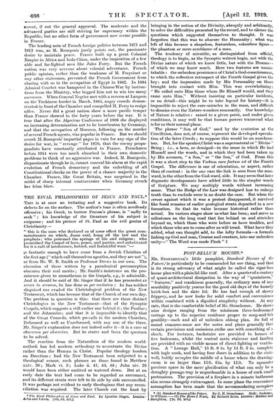THE RIVAL PHILOSOPHIES Oe' JESUS AND PAUL. * THIS is at
once an irritating and a suggestive hook. Its defects lie on the surface. The author's tone is often needlessly offensive ; his Greek, to borrow Poison's phrase, is "sadly to seek " ; his knowledge of the literature of his.subject is exiguous ; and his picture of St. Paul as the evil genius of Christianity- "` this is the man who declared as of none effect the great com- mandments on which, Jesus said, hung all the law and the prophets; who poisoned the springs of life and religion; who proscribed the Gospel of love, peace, and justice, and substituted for it a met of intolerance, hatred, and fratricidal wars "-
is fantastic enough to have come from a Jewish Christian of the first age (" which call themselves apostles, and they are not"), or from Mr. W. B. Smith or Professor Brews in our own. The obsession of these writers by a paradoxical preconception obscures their real merits ; Mr. Smith's insistence on the pro. reinenc.e given to monotheism in the Gospels, e.g., is admirable. And it should be said of Mr. Singer that if he has proceeded ex errore in errorem, he has done so per veritatem ; he has neither disguised nor evaded the Christological problem of the New Testament, which has become that of the Church of our own day. The problem in question is this: that there are three distinct Christologics in the New Testament—that of the Synoptic Gospels, which suggests a still earlier one behind it ; the Pauline; and the Johannine ; and that it is impossible to identify that of the Great Councils, which prevails in the modern Churches, Reformed as well as Unreformed, with any one of the three. Mr. Singer's explanation does not indeed solve it—it is a ease of obseurum per obscurins. But he states and faces the question to be solved.
The reaction from the Naturalism of the modern world- outlook has led modern orthodoxy to accentuate the Divine rather than the Human in Christ. Popular theology borders on Docetism : had the New Testament been subjected to a theological censor, such phrases as those found in Matthew xxiv. 36 ; Mark vi. 5 ; Luke ii. 41, 43, 48 ; John xiv. 28 would have been either omitted or watered down. But at an early date the text had come to be regarded as sacrosarict, and its different strata were left to lie side by side unreconciled. It was perhaps not evident to early theologians that any recon- ciliation was required. The later Church cut the knot by • The Meal Philosoph,e of Jews and Paul. BY Iguanas Slayer. 'mann' Mon and Unwln. Lulu. 0d. net.] bringing in the notion of the Divinity, abruptly and arbitrarily, -to solve the difficulties presented by the record, and to silence the questions which suggested themselves to thought. It was forgotten that this was to obscure the Humanity ; what was left of this became a shapeless, featureless, colourless figure— the phantom or mere semblance of a man.
The tendency of scientific, as distinguished from official, theology is to begin, as the Synoptic writere begin, not with the Divine nature of which an know little, but with the Human- a which we may know mush. Here two features are unmis- takable : the unbroken persistence of Christ's Godeeouseicaniness, to which the refleetive retroseeet, of the Fourth Gospel gives the key ; and the impression made by His Personality on those brought into contact with Him. This was overwhelming : " He called unto Him those whom He Himself would, and they came unto Him." Without insisting on particular incidents, or on detail—this might be to take legend for history—It is impossible to reject the cure-miracles in the mass, and difficult to dismiss even the Nature-wonders-summarily. Our knowledge of Nature is relative : raised to a given point, and under given eonditione, it may well be that human powers transcend what is for us their normal plane.
The phrase " Son of God," used by the centurion at the Crucifixion, does not, of course, represent the developed specula- tion of the later Creeds ; to suppose this would be an anachron- ism. But, for the speaker,Christ was a supernatural or " Divine " Being ; i.e., a, hero, or demigod—in the sense in which He bad Himself used the words, and in which they had been taken up by His accusers, " a Son," or " the Son," of God. From this it was a short step to the Yerevan rare factum eat of the Fourth Gospel. The difference is one of orientation, or aspect, rather than of content : in the one ease the link is seen from the man- ward, in the other from the God-ward, side. It may seem that later dogmatic developments have added little to the simpler words of Scripture. We may multiply words without increasing sense. That the Hedge of the Law was designed less to enlarge 'truth than to exclude error is no doubt the case. But when the errors against which it was a protest disappeared, it survived like fossil remains of earlier geological strata deposited in a new formation. So that its value became historical rather than actual. Its various -stages show us what has been; ancieerve as milestones on the long road that lies behind us and stretches beyond us, which those who were before us have trodden, and -which those who are to come after us will tread. What have they added, what can thought add, to the lofty formula--a formula linking up God and man, Creator and creature, into one unbroken emity—" The Word was made Flesh "



































 Previous page
Previous page